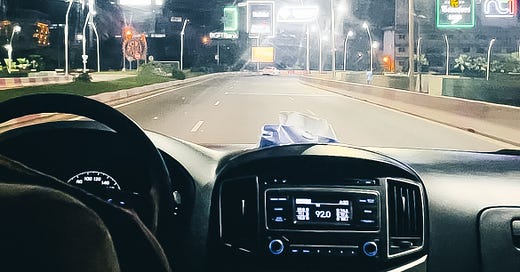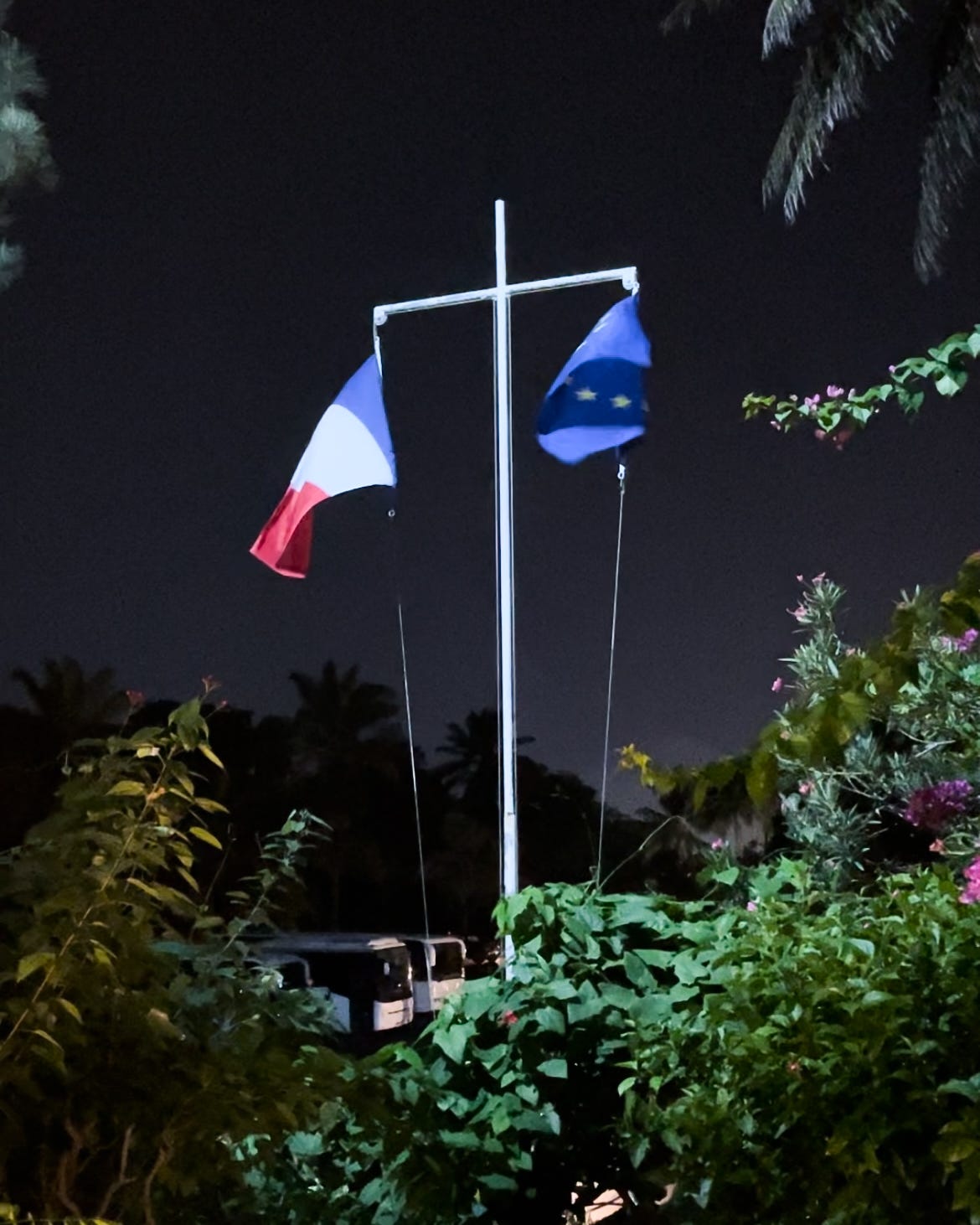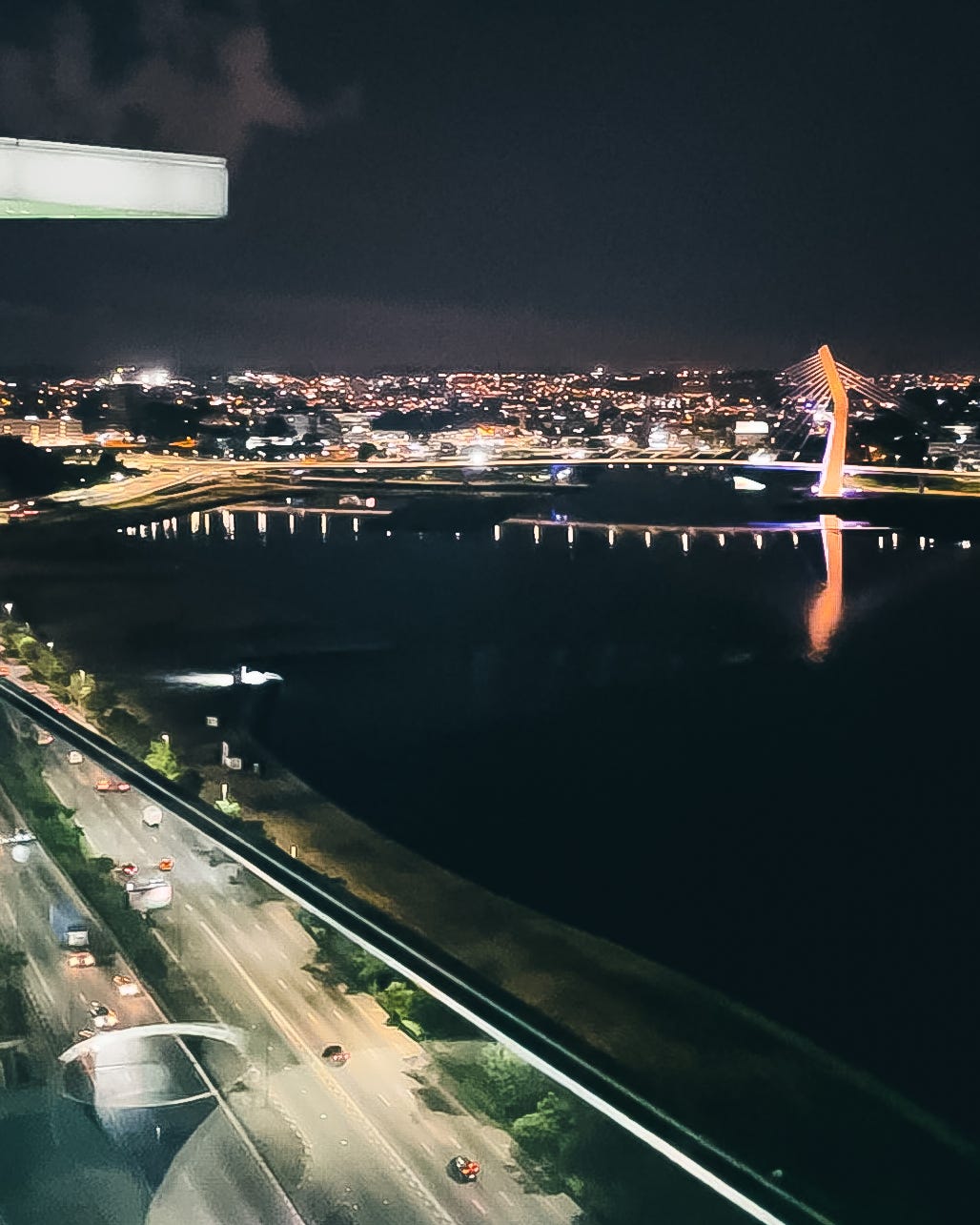I was in Abidjan thinking about a future that will never, ever come
Impossible utopias and dem things deh
Currently: sitting on a park bench freezing my fingers off (spring, where?!) while one kid plays football and the other is on the adventure playground
Reading: Fast By The Horns by Moses McKenzie (a damn good book, out in a couple weeks)
Watching: Baby Reindeer on Netflix
Listening: ‘SWEET ★ HONEY ★ BUCKIIN’’ by Beyoncé and Shaboozey
Thinking: about Beyond The Bassline: 500 Years of Black British Music at The British Library…*chef’s kiss*
“Parlez-vous anglais?” I asked the young man sat in the centre of the group behind the reception desk.
His eyes slid over me, then off to the side.
“Non,” was all he said in response.
As a native English speaker, I am used to being understood, and where understanding is lacking, I am used to being pandered to, if I’m honest.
There was no ‘Sorry, let me find someone who does speak English’, or eager hand gestures that would have communicated similar. It was ‘no’, full stop, end of sentence.
I was in Abidjan, the largest city in Côte d’Ivoire. The moment I stepped off the plane that morning at 4am, I had that feeling I always feel when landing in Africa: “Ahhh… home.”
The humidity of the metropolis was just like Lagos; the relaxed, orderliness reminded me of Johannesburg. But the main difference here was everyone spoke French and nothing else, apparently.
I find Francophone Africans easier to understand than Francophone Europeans, but my brain felt like it started working backwards as soon as it came time to respond in French. Quite frankly, I felt like an idiot, completely out of my depth, stammering out half sentences and forgetting to silence the ‘t’ at the end of words, which rendered my already poorly-composed reply complete jibberish.
The language barrier proved even more mentally draining the following day, as I sat on a panel with four scholars to discuss ideas around reclaiming African culture and heritage and the “post-colonial” museum.
There were three things to contend with: first, I had a headset with a translator relaying English directly into my ear. Great in theory, but in practice it meant that I was receiving everything late, and whenever I was asked a question there were a few awkward seconds of silence while everyone waited for me to finish listening to the translation before I gave my response.
The second thing was the fact that, though I knew translation headsets were available for my fellow panellists and the audience to listen to my translated contributions, I didn’t see anyone wearing them. I had no idea how many people were actually understanding what I was saying or whether everyone else was patiently waiting for the Anglophone to finish waffling nonsense before they returned to the real discussion.
The third thing was more cultural: Francophones love to talk at length. So imagine me there with my little headset, listening to a delayed English translation of lengthy expositions, then furiously scribbling down my objections in a notebook so that when my turn to talk came around, perhaps ten or fifteen minutes later, I would be prepared.
There was also the fact that I was one of only two women, the youngest, the only Anglophone and the only non-scholar. To be honest, the experience was character-building!
The great irony was that one of the major themes of the conference I was taking part in was strengthening the relationship between Africa and Europe. Me there with my incomprehensible self was certainly not making the realisation of such a goal easier – nevermind the questions such a theme throws up: strengthening the relationship to what end and on whose terms? But there were other contradictions to navigate as well.
The very idea of a “post-colonial” museum was one that I highlighted when I got my opportunity to speak. The museum in and of itself is a colonial invention, and the British Museum is a perfect example of an archive of a pillaging empire that existed solely to show off Britain’s extensive loot. (Later on I was lightly reprimanded by a nice, older, English-speaking lady for throwing the British Museum under the bus.)
Then there was the fact that I was invited by the Institut Français, who organised the conference alongside the French Embassy in Abidjan. The idea that these conversations and debates about the future of Africa and its relationship to Europe were being programmed and curated by a former colonial power raises questions around conflicts of interests in itself. But this is the world we live in. The gulf between ideals and reality is as vast as it ever was before.
Colonialism happened and did a number on us. We are left trying to sift through the binds and knots of the world that it gave birth to, and create something better from its rotting remains. There is a certain level of pragmatism that is needed to navigate these immense contradictions; how do you maintain purity of purpose when the tools at your disposal are, at the very least, tainted?
Pragmatism is something that I was thinking about a lot as I wrote my second novel, All That We’ve Got (out in July! pre-order now!). One of my main characters, Abi, is a 15-year-old girl weighing up the reality of the violence of policing in her community with her own desire to feel safe and see justice done after great harm comes to her and her friends from some local boys. As I was writing, I was thinking about abolition as an ideal versus the complicated reality of application.
My final evening in Abidjan, I sat down for dinner with Moses, Armande and Lewis on the 7th floor of a five star hotel, overlooking the lagoon. Four young(ish) black people from the diaspora; each of us having grown up in the countries that colonised our ancestors. In this scene alone, contradictions abound.
As our mains arrived, Lewis asked each of us what we think needed to change for black people back in France and Britain, in order for greater liberation for our communities. I spoke briefly about some of the ideas I was thinking about as I wrote All That We’ve Got; the African philosophy of ubuntu, a Bantu word loosely translated as “I am because we are”, and the need to move away from Western individualism.
Moses agreed and mentioned abolition and self-policing as part of this way forward. “But we don’t trust each other,” I replied. “Abolition isn’t possible until we can truly say we trust each other.”
The question is, will we ever get to that place?
Maybe there was once a time where a truly abolitionist future was completely possible, but the boat(s) sailed on that long ago. We live in the world scaffolded by racialised capitalism and white supremacy; where inequality is prescription and the fight against it is undermined by the ideas we are taught from young to pledge allegiance to.
As a Christian (some would say another grand and splintered contradiction) I know any glimpse of utopia is impossible this side of eternity. It just is. We are incredibly flawed creatures; inherently self-seeking and self-serving. Yet, the great contradiction of my faith is that I am compelled to work towards utopia anyway.
One of my favourite memories of my time in Abidjan were the long, animated conversations I had with Moses and Armande. We debated the legacies of dead rappers, dating and relationships – turns out no matter where you go in the world, the streets are the streets! – and got into it about religion and conceptions of the Almighty.
“The problem isn’t religion, it’s dogma,” Moses, who grew up attending church but converted to Islam as a teenager, asserted.
To be dogmatic is to be unyielding; a stern lecture where dialogue is seen as a threat. Dogma is autocratic idealism; an iron fist instead of unicorns and rainbows.
Dogma doesn’t only exist in the realm of religion, but the irony of that particular manifestation is it presumes to be the final word on an Almighty who is as much unknowable as they are knowable. While I do believe in definite truth, the greatest discovery along this journey is the more I learn, the more I realise how much I still don’t know.
I hope that these existential realisations keep me humble, curious, sure in my convictions but prepared to be wrong should enough evidence present itself. Take this approach and apply it to the material world, and I arrive at an optimistic pragmatism.
We exist in too many states of contradiction for us to reach our ideals. Still, we should march towards the utopia we imagine beyond the horizon. We will never get there, but still, we must go, because the attempt alone will make us better. And we can always, always be better.






